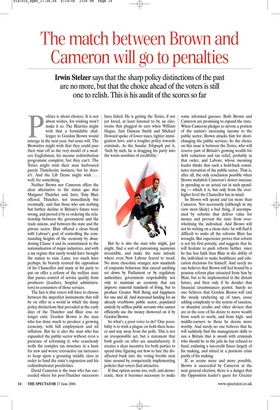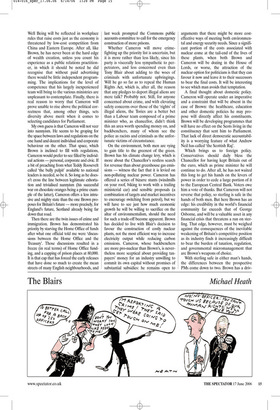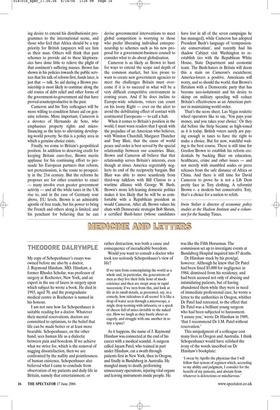The match between Brown and Cameron will go to penalties
Irwin Stelzer says that the sharp policy distinctions of the past are no more, but that the choice ahead of the voters is still one to relish. This is his audit of the scores so far Politics is about choices. It is not about wishes, for wishing won’t make it so. The Blairites might wish that a formidable challenger to Gordon Brown would emerge in the next year, but none will. The Brownites might wish that they could pass their man off as the very model of a modern Englishman, his income redistribution programme complete, but they can’t. The Tories might wish their man harboured purely Thatcherite instincts, but he doesn’t. And the Lib Dems might wish ... well, for something.
Neither Brown nor Cameron offers the clear alternative to the status quo that Margaret Thatcher and, later, Tony Blair offered. Thatcher, not immediately but eventually, said that those who saw nothing but further decline in Britain’s future were wrong, and proved it by re-ordering the relationship between the government and the trade unions, and between the state and the private sector. Blair offered a clean break with Labour’s goal of controlling the commanding heights of the economy by abandoning Clause 4 and its commitment to the nationalisation of major industries, and with a tax regime that surely would have brought the nation to ruin. Later, too much later perhaps, he bravely resisted the opposition of his Chancellor and many in his party to put on offer a reform of the welfare state that passes control of service quality from producers (teachers, hospital administrators) to consumers of those services.
The fact is that voters will have to choose between the imperfect instruments that will be on offer in a world in which the sharp policy distinctions that prevailed in the early days of the Thatcher and Blair eras no longer exist. Gordon Brown is the man who has done much to produce a growing economy, with full employment and nil inflation. But he is also the man who has expanded the public sector without even a pretence of reforming it; who ceaselessly trolls the complex tax structure in a hunt for new and worse retroactive tax increases to heap upon a groaning middle class in order to fund the state’s expansion and his redistributionist proclivities.
David Cameron is the man who has succeeded where his post-Thatcher successors have failed. He is getting the Tories, if not yet loved, at least listened to by an electorate that plugged its ears when William Hague, Iain Duncan Smith and Michael Howard spoke of lower taxes, tighter immigration laws, and a tougher policy towards criminals. As the Sunday Telegraph put it, ‘Inch by inch, he is dragging his party into the warm sunshine of credibility.’ But he is also the man who might, just might, find a sort of patronising nannyism irresistible, and make the state intrude where even New Labour feared to tread. No more chocolate oranges; new standards of corporate behaviour that exceed anything set down by Parliament or by regulatory authorities; government responsibility not only to maintain an economy that can improve material standards of living, but to produce Greater Well Being and happiness for one and all. And increased funding for an already overblown public sector, populated entirely by selfless public servants who cannot efficiently use the money showered on it by Gordon Brown.
So what’s a poor voter to do? One possibility is to wish a plague on both their houses and stay away from the polls. This is not an irresponsible act, but a statement that both goods on offer are unsatisfactory. It creates a clear incentive for both parties to spend time figuring out how to lure the disaffected back into the voting booths next time around by competently implementing policies that voters find attractive.
If that option seems too, well, anti-democratic, then it becomes necessary to make some informed guesses. Both Brown and Cameron are promising to expand the state. When Cameron pledges to devote a portion of the nation’s increasing income to the public sector, Brown attacks him for shortchanging the public services. So the choice on this issue is between the Tories, who will reserve part of Britain’s growing wealth for debt reduction and tax relief, probably in that order, and Labour, whose incoming leader thinks that such a hold-back constitutes starvation of the public sector. That is, after all, the only conclusion possible when Brown mislabels Cameron’s slower increase in spending as an actual cut in such spending — which it is, but only from the everhigher level the Chancellor has in mind.
So Brown will spend and tax more than Cameron. Not necessarily (although in my view most likely) a bad thing, if accompanied by reforms that deliver value for money and prevent the state from overwhelming the individual. And Brown will not be writing on a clean slate: he will find it difficult to undo all the reforms Blair has wrought. But experience proves that reform is not his first priority, and suggests that he will hesitate to push reform further, since he has less faith than Blair in the ability of the individual to make healthcare and education decisions for himself. And surely no one believes that Brown will feel bound by a pension reform plan extracted from him by Blair, but to be implemented in the distant future, and then only if he decides that financial circumstances permit. Surely no one believes that Gordon Brown will end the steady ratcheting up of taxes, cease adding complexity to the system of taxation, or abandon credits and other devices that are at the core of his desire to move wealth from south to north, and from highand middle-earners to those he deems more worthy. And surely no one believes that he will suddenly find the management skills to run a Britain that is awash with criminals who should be in the jails he has refused to fund, enduring a tax-credit fiasco largely of his making, and mired in a pensions crisis partly of his making.
If, as seems more and more possible, Brown is succeeded by Cameron at the next general election, there is a danger that the Opposition leader’s quest for Greater Well Being will be reflected in workplace rules that raise costs just as the economy is threatened by low-cost competition from China and Eastern Europe. After all, like Brown, he has never been at the hard edge of wealth creation, unless you count his experience as a public relations practitioner, in which it should be noted he did recognise that without paid advertising there would be little independent programming. The implications for the level of competence that his largely inexperienced team will bring to the various ministries are unpleasant to contemplate. Finally, there is real reason to worry that Cameron will prove unable to rise above the political correctness that, among other things, sets diversity above merit when it comes to selecting candidates for Parliament.
My own guess is that Cameron will not veer into nannyism. He seems to be groping for the space between laws and regulations on the one hand and decent individual and corporate behaviour on the other. That space, which Brown is inclined to fill with regulations, Cameron would prefer to see filled by individual actions — personal, corporate and civic. If a bit of preaching from what Teddy Roosevelt called ‘the bully pulpit’ available to national leaders is needed, so be it. So long as he doesn’t cross the line between legitimate exhortation and trivialised nannyism (his successful war on chocolate oranges being a prime example of the latter), Cameron offers a less intrusive and mighty state than the one Brown proposes for Britain’s future — more precisely, for England’s future, Scotland already being far down that road.
Then there are the twin issues of crime and immigration. Brown has demonstrated his priority by starving the Home Office of funds after what one official told me were ‘discussions between the Home Office and the Treasury’. Those discussions resulted in a freeze (in real terms) of Home Office funding, and a capping of prison places at 80,000. It is that cap that has forced the early releases that have done so much to create the mean streets of many English neighbourhoods, and last week prompted the Commons public accounts committee to call for the emergency construction of more prisons.
Whether Cameron will move crimefighting up the priority list is uncertain, but it is more rather than less likely, since his party is viscerally less sympathetic to perpetrators, and less concerned even than Tony Blair about adding to the woes of criminals with unfortunate upbringings. Will he go so far as to repeal the Human Rights Act, which is, after all, the reason that any pledges to deport illegal aliens are mere talk? Probably not. Still, for anyone concerned about crime, and with elevating safety concerns over those of the ‘rights’ of illegal aliens, the Tories are a better bet than a Labour team composed of a prime minister who, as chancellor, didn’t think this an area worth spending money on, and backbenchers, many of whom see the police as racists and criminals as the unfortunate victims of circumstance.
On the environment, both men are vying to gain title to the greenest of the green. Brown has his climate change levy, which is more about the Chancellor’s restless search for revenue than about greenhouse gas emissions — witness the fact that it is levied on non-polluting nuclear power. Cameron has offered a series of bizarre stunts (windmills on your roof, biking to work with a trailing ministerial car) and sensible proposals (a combination of targets and market incentives to encourage switching from petrol), but we will have to see just how much economic growth he will be willing to sacrifice on the altar of environmentalism, should the need for such a trade-off become apparent. Brown has decided to live with Blair’s decision to favour the construction of costly nuclear plants, not the most efficient way to increase electricity output while reducing carbon emissions. Cameron, whose backbenchers are more pro-nuclear than Brown’s, is nevertheless more sceptical about providing taxpayers’ money for an industry unwilling to commit its own capital without promises of substantial subsidies: he remains open to arguments that there might be more costeffective ways of meeting both environmental and energy security needs. Since a significant portion of the costs associated with nuclear come at the tail-end of the lives of these plants, when both Brown and Cameron will be dozing in the House of Lords, or worse, the attraction of the nuclear option for politicians is that they can favour it now and leave it to their successors to bear the final costs. It will be interesting to see which man avoids that temptation.
A final thought about domestic policy. Cameron will operate under an imperative and a constraint that will be absent in the case of Brown: the healthcare, education and other domestic policies he may propose will directly affect his constituents. Brown will be developing programmes that will have no effect on the Scots living in the constituency that sent him to Parliament. That lack of direct democratic accountability is a worrying feature of what Andrew Neil has called ‘the Scottish Raj’.
Which brings us to foreign policy. Conservatives should daily bless the Chancellor for having kept Britain out of the euro, which as prime minister he will continue to do. After all, he has not waited this long to get his hands on the levers of power in order to cede a large portion of it to the European Central Bank. Voters owe him a vote of thanks. But Cameron will not reverse that policy, so sterling is safe in the hands of both men. But here Brown has an edge: his credibility in the world’s financial community far exceeds that of George Osborne, and will be a valuable asset in any financial crisis that threatens a run on sterling. That edge, however, must be weighed against the consequences of the inevitable weakening of Britain’s competitive position as its industry finds it increasingly difficult to bear the burden of taxation, regulation, and governmental micromanagement that are Brown’s weapons of choice.
With sterling safe in either man’s hands, the differences between the prospective PMs come down to two. Brown has a driv ing desire to extend his distributionist programmes to the international scene, and those who feel that Africa should be a top priority for British taxpayers will see him as their man. Others will think that past schemes to provide aid to these kleptocracies have done little to relieve the plight of that continent’s suffering masses. Brown has shown in his policies towards the public services that his talk of reform first, funds later, is just that — talk. So aid during a Brown premiership is most likely to continue along the old routes of debt relief and other forms of the government-to-government aid that have proved counterproductive in the past.
Cameron and his Tory colleagues will be more willing to condition future aid on genuine reforms. More important, Cameron is a devotee of Hernando de Soto, who emphasises property rights and microfinancing as the keys to alleviating developing-world poverty. So this is a policy area in which a genuine choice exists.
Finally, we come to Britain’s geopolitical position. In addition to deserving credit for keeping Britain euro-free, Brown merits applause for his continuing effort to persuade his European partners that reform, not protectionism, is the route to prosperity in the 21st century. But the reforms he proposes are for other countries to enact — many involve even greater government activity — and all the while taxes in the UK rise to, and in the case of Germany soar above, EU levels. Brown is an admirable apostle of free trade, but his power to bring the French and others along is limited, and his penchant for believing that he can devise governmental interventions to meet global competition is worrying to those who prefer liberating individual entrepreneurship to schemes such as his new proposal for a government-business council to consider what to do about globalisation.
Cameron is as likely as Brown to hunt for ways to extend the scope and depth of the common market, but less prone to want to create new government agencies to meet the challenges Britain must overcome if it is to succeed in what will be a very difficult competitive environment in coming years. And if he does incline to Europe-wide solutions, voters can count on his loony Right — ever on the alert to avoid the debilitating effect of contact with continental Europeans — to call a halt.
When it comes to Britain’s position in the world, I must warn readers that I speak with the prejudice of an American who believes, with Winston Churchill, Margaret Thatcher and Tony Blair, that the cause of world peace and order is best served by the special relationship between our countries. Blair, Brown and Cameron all believe that that relationship serves Britain’s interests, even though at times America regrettably neglects its end of the reciprocity bargain. But Blair was able to move seamlessly from third-way talkfests with Bill Clinton to a wartime alliance with George W. Bush. Brown’s more left-leaning domestic politics makes it less likely that he will be as comfortable with a Republican president as would Cameron. After all, Brown values his chats with Democratic strategist Bob Shrum, a certified Bush-hater (whose candidates have lost in all of the seven campaigns he has managed), while Cameron has adopted President Bush’s language of ‘compassionate conservatism’, and recently had his shadow Cabinet visit Washington to reestablish ties with the Republican White House, State Department and economic team. The Bush-haters in Britain will deem this a stain on Cameron’s escutcheon; America-lovers a positive. Americans will worry, and so should the world, that Brown’s flirtation with a Democratic party that has become neo-isolationist and his desire to skimp on military spending will reduce Britain’s effectiveness as an American partner in maintaining world order.
That’s the score sheet. Las Vegas roulette wheel operators like to say, ‘You pays your money, and you takes your choice.’ Or they did before the Strip became as high-toned as it is today. British voters surely are paying enough in taxes to have the right to make a choice. But for now, watchful waiting is the best course. There is still time for Gordon Brown to establish his reform credentials by backing Blair on education, healthcare, crime and other issues — and not merely with mumbled asides or press releases from the safe distance of Africa or China. And there is still time for David Cameron to prove he is not a Lib Dem pretty face in Tory clothing. A reformist Brown v. a modern but conservative Tory, that’s a choice for a nation to relish.




















































































 Previous page
Previous page